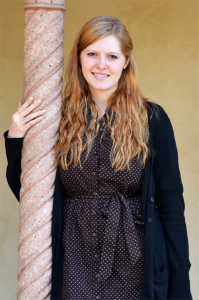 Melissa Cober loves many things – Lindy hopping, playing the piano, and baking crêpes are on the short list – but few things are as beautiful to her as the French language. Maybe that’s why her senior thesis is written in French.
Melissa Cober loves many things – Lindy hopping, playing the piano, and baking crêpes are on the short list – but few things are as beautiful to her as the French language. Maybe that’s why her senior thesis is written in French.
A synthesis of her dual majors at Scripps (French studies and gender and women’s studies) Melissa’s thesis – translated into English as Lying Bodies: Herculine Barbin and Sexual Ambiguity in 19th-Century France – focuses on the memoirs of Herculine Barbin, a famous 19th-century French hermaphrodite who struggled with his/her identity “despite living in a society that implicitly suggests that s/he, by definition, should not have one.”
Melissa’s interest in contemporary intersex activism prompted an analysis of Barbin as “one of the major precursors to these movements, especially since s/he is one of the first intersex individuals to translate his/her lived experiences of sexual ambiguity into writing.” The study of Barbin’s memoirs, she argues, is relevant and important when considering modern intersex issues in France, the United States, and the rest of the world.
A Writing 50 class on women’s health also sparked Melissa’s interest in gender and women’s studies and her thesis topic choice. She found her greatest challenge “overcoming my perfectionism in the first stages of writing and forcing myself to put pen to paper even when I didn’t feel good about the quality of my writing.”
However, she found both her own perseverance and her Scripps education to be useful tools. Melissa’s academic experience at Scripps “has honed my critical thinking skills, which has allowed me to engage with and even critique the theorists that I look up to in my field,” and greatly enhanced her ability to “choose a topic that I was truly passionate about and take it in any direction I wanted.”
“I discovered a passion for reading social theory here at Scripps,” Melissa says, “and gender and women’s studies classes constantly challenge my world view and the assumptions that I take most for granted.”

